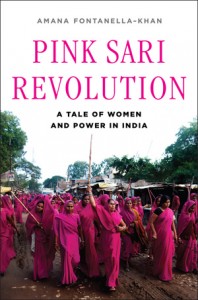The Gulabi Gang is an Indian women’s group of pink sari-wearing vigilantes who wield laathis (bamboo sticks) and tackle domestic abuse and other violence against women, in addition to other issues. Pink Sari Revolution: A Tale of Women and Power in India tells the story of the gang with a focus on the founder Sampat Pal, the wife of an ice cream vendor, mother of five children, and a former government health worker.

The author of Pink Sari Revolution, Amana Fontanella-Khan, writes regularly on issues such as prostitution, rape, reproductive issues and women’s empowerment. She is a contributor to Slate, the Daily Beast, the New York Times, the Christian Science Monitor, and was formerly a contributing editor at Vogue India. The Brussels-based author also lived in India for over four years, so it’s not hard to see why she wanted to write a book on the Gulabi Gang and its founder after hearing about them.
Fontanella-Khan spent time in Bundelkhand, Uttar Pradesh, with Sampat Pal and her family. Read the interview to learn more about that experience, the author’s thoughts on the Gulabi gang and violence, and what might happen if Pal officially moves into politics. After the interview, read an excerpt from Pink Sari Revolution.
How did you first come across the story of the Pink Sari Gang and Sampat Pal? What compelled you to write it?
I came across the Pink Gang in 2010. I was living in Bombay at the time and a friend of mine, who had met Sampat, spoke to me in enthusiastic terms about her organization. I had never heard anything like it before. Everything about the gang, from their uniforms, to their sticks and their courageous battle fascinated me. Once I spent time with the gang members, and learned about their remarkable life stories, I found it very hard not to write about them.
What was it like being in Uttar Pradesh, India, where the Pink Gang is based? How was it living with Sampat Pal and her family as you researched and wrote the book?
I lived in India for 4 1/2 years, but I was based in Bombay and later Delhi, neither of which are representative of the rest of the country. Going to Uttar Pradesh from these big cities felt like time-traveling hundreds of years into the past. Development has barely touched many parts of UP. People still live in mud huts, draw water from wells and make do without electricity. The lawlessness was also striking.
 That said, spending time there, especially living with Sampat, is an experience I greatly treasure. The truth is, I had a great deal of fun writing the book. Sampat is quite a character and there is never a dull moment around her. I got on fabulously with her family too. There was a lot of banter and joking in her house; the playfulness and warmth of Sampat and her family made me feel very at home and comfortable. I miss Bundelkhand and the friends I made there greatly!
That said, spending time there, especially living with Sampat, is an experience I greatly treasure. The truth is, I had a great deal of fun writing the book. Sampat is quite a character and there is never a dull moment around her. I got on fabulously with her family too. There was a lot of banter and joking in her house; the playfulness and warmth of Sampat and her family made me feel very at home and comfortable. I miss Bundelkhand and the friends I made there greatly!
In the book you describe a protest, a gherao, at a police station, and other protests. Were you there at any of the Pink Sari gang’s protests? What do you think of how they use violence or threats of violence?
I attended Pink Gang protests, but they were never violent. On the whole, the gang eschews violence. What they employ to varying degrees, however, is the threat of violence. They have deliberately cultivated an image that is muscular and aggressive, despite the fact that they rarely harm anyone (and when they do, only the mildest of violence is used — a light whack or smack on the behind, for example). Their image provides them with street-cred and also attracts media coverage, which is one of their greatest sources of power. On the whole, I am comfortable with the Pink Gang activities that I have seen so far.
Will the Pink Sari Gang continue if Sampat Pal is elected to public office? How might its work or focus change if she holds public office?
It is difficult to speculate how things might change if Sampat becomes a politician. She argues that it will benefit the down-trodden because she will have more power to improve their lives. Of course, some are concerned that she might become co-opted by political parties, and forced to make compromises, but she is convinced that she will not let this happen. We will just have to wait and see!
Would the Pink Gang have emerged without a Sampat Pal?
Absolutely not. Sampat Pal is synonymous with the organisation. It was born out of her vision and hard work — she is very much the leader of the organization and without her I don’t think it would last very long.
What are you up to in Brussels? What’s next for you — can reader’s expect another book?
I now work as a journalist in Brussels, where I am keeping an eye out for potential new book ideas.
Pavani Yalamanchili is a co-founder and editor of The Aerogram. Email her at editors@theaerogram.com. Find The Aerogram on Twitter @theaerogram.












